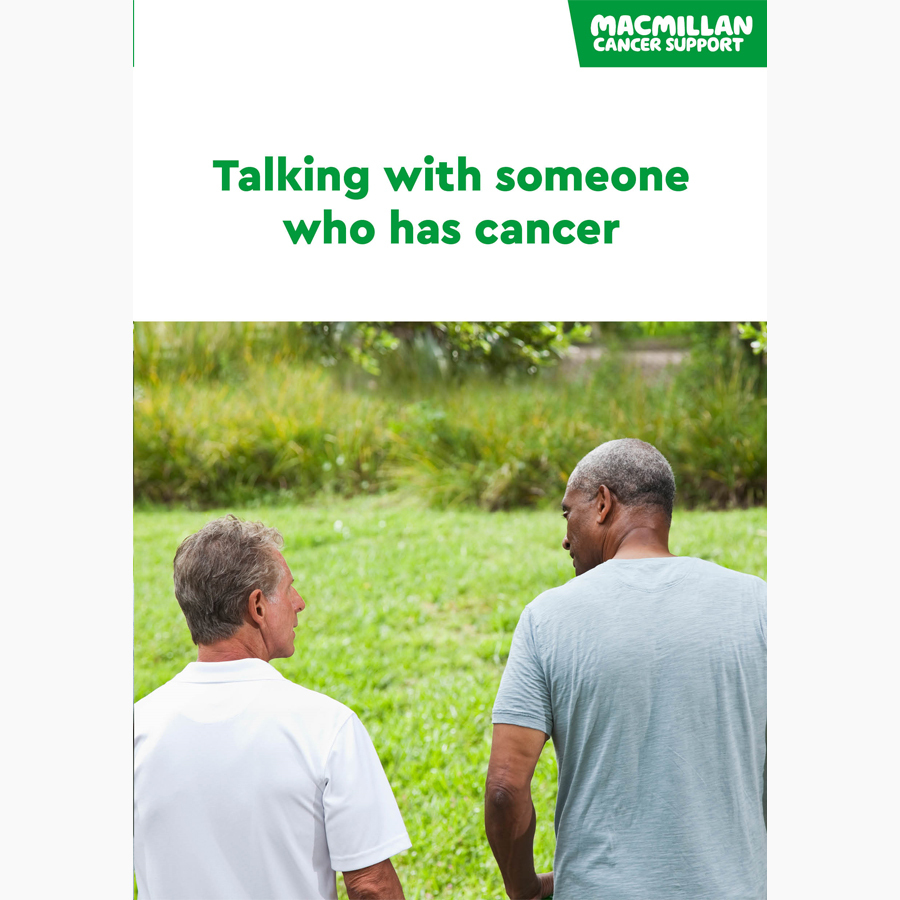How to tell people you have cancer
Telling family and friends about the cancer can help them support you.
Telling people about cancer
You may not want to talk about the cancer, but your family and friends may want to. If this happens, try to be open and honest with them. Let them know it is hard for you to talk. You could tell them you might not feel able to share everything.
If family or friends want to talk about the cancer when you do not, it can cause problems. We have information on cancer diagnosis and your relationships.
Only you can decide how much you want to talk about your diagnosis or treatment. For example, if you are going out with friends, you could tell them you would rather not talk about cancer today. Or you could say you will talk about it when you feel able to.
Related video
Tips for having easier conversations
The following tips can help make conversations easier.
Tell them in the way that feels best for you
Talking face to face can be difficult, especially if the other person lives far away. You may find it easier to give the news:
- over the phone
- in a letter
- by text or email.
Introduce the subject gradually
Do this in a way that feels right for you. If you are not sure how to start, you could say something like this:
- ‘This is going to be difficult, but I need to tell you something.’
- ‘You know I have been feeling unwell for a while. I have had some tests and they have found out what’s wrong.’
Ask what they already know
This can stop you repeating information.
Think about what is most important to you
You may feel as though there are a lot of things to think about. But if you focus, you might find that there are only 2 or 3 things that you really want to talk about.
Try to tell the person the main things you are worried about. You could start by saying something general, such as, ‘I’m worried about how things are at the moment.’ And then you can go into more detail.
Give the information slowly
Say a few sentences and check the other person understands what you are saying before you carry on. You can ask questions like, ‘Does that make sense?’ Asking the other person if they understand may help you feel listened to.
Tell them how you feel
You may want to sound positive and cheerful to make your family member or friend feel better. If you are not feeling too worried about your situation, this is fine. But it is important they know if you are worried, so they can support you.
Do not worry about silences
Sometimes you or the person you are talking to may not know what to say. Holding hands, hugging or just sitting quietly together for a while may help.
If you find a silence is uncomfortable, you could ask a simple question such as, ‘What are you thinking about?’
Be open
It is better for your family and friends to know the facts about the cancer from the start. If they find out later, they may feel hurt and upset that they have not been able to support you.
If you are not sure how well your treatment will work, you may want to talk about this with your family or friends. This will help them support you better.
Ask for help to tell other people
Telling people about the cancer diagnosis can be tiring. You can ask someone you trust to tell other people for you. You can tell them what information you want them to share.
It is okay not to talk about cancer
You may not want to discuss serious issues all the time. Just chatting about everyday things can also help you feel that normal life still goes on.
Accept and ask for help
Family or friends will often offer their support. If you cannot think of anything at that time, you can thank them and tell them you may ask them later.
If they do not offer support and you would like some, ask them for it. Use the tips above to help you ask for support.
You can download our Ask for support tool [PDF, 18.6KB] to write down what support you need. We have added an example. If you think you need support, this could help you start a conversation with people close to you.
Tips for dealing with people's reactions
You may not get the reaction you expect. We have suggested a few ways to make it easier for both of you.
Accept their feelings
Remember that the person you are telling about the cancer cares about you. But they may be struggling to accept the cancer or may not know the best way to help you.
When you are trying to cope with cancer, it may upset you to have to deal with their feelings. But try not to avoid them or ignore their feelings, as it may make things worse.
Try to respond
How you respond can help other people talk about how they are feeling. You could say things like:
- ‘When I talk about the cancer, you look really upset.’
- ‘I know you are feeling very helpless and taking control is your way of coping, but…’.
It might help to say how you feel too. For example, you might say things like this:
- ‘I think both of us are finding this awful.’
- ‘I know you are worried about what could happen and so am I.’
The more aware you both are of each other’s feelings, the better you can communicate.
If a person does not want to talk, ask them to listen
Some people find it hard to talk about things that upset them. You can tell them that they do not need to talk, but you would just like them to listen.
Talk about other things
If someone finds it hard to discuss the cancer diagnosis, it may be easier to talk about other things. This can also be useful, as it gives you time to talk about things other than cancer.
Ask to have a break from talking
Ask to have a break from talking if you are:
- being forced to talk before you are ready
- finding the conversation difficult to deal with.
You can come back to the conversation when you feel ready.
Find other sources of support
Some people may not be able to support you in the way you would like. They may need more time to deal with their own feelings. However, you can find other sources of support. You could:
- talk to another relative, friend or colleague
- call the Macmillan Support Line for free on 0808 808 00 00
- join a support group
- ask your GP about talking therapy
- get support online, for example by joining our Online Community.
About our information
This information has been written, revised and edited by Macmillan Cancer Support’s Cancer Information Development team. It has been reviewed by expert medical and health professionals and people living with cancer.
-
References
Below is a sample of the sources used in our Talking information. If you would like more information about the sources we use, please contact us at informationproductionteam@macmillan.org.uk
Sharpe L, Curran L, Butow P, Thewes B. Fear of cancer recurrence and death anxiety Psycho‐Oncology. 2018;27:2559–2565. Available from Fear of cancer recurrence and death anxiety - Sharpe - 2018 - Psycho-Oncology - Wiley Online Library [accessed February 2023]
Zeng Q, Ling D, Chen W, et al. Family Caregivers’ Experiences of Caring for Patients with Head and Neck Cancer. A systematic Review and Metasynthesis of Qualitative Studies. Cancer Nursing 2023; 46,1, 14-28. Available from Family Caregivers’ Experiences of Caring for Patients With Head and Neck Cancer - PMC (nih.gov) [accessed February 2023]
Date reviewed

Our cancer information meets the PIF TICK quality mark.
This means it is easy to use, up-to-date and based on the latest evidence. Learn more about how we produce our information.
The language we use
We want everyone affected by cancer to feel our information is written for them.
We want our information to be as clear as possible. To do this, we try to:
- use plain English
- explain medical words
- use short sentences
- use illustrations to explain text
- structure the information clearly
- make sure important points are clear.
We use gender-inclusive language and talk to our readers as ‘you’ so that everyone feels included. Where clinically necessary we use the terms ‘men’ and ‘women’ or ‘male’ and ‘female’. For example, we do so when talking about parts of the body or mentioning statistics or research about who is affected.
You can read more about how we produce our information here.
How we can help





